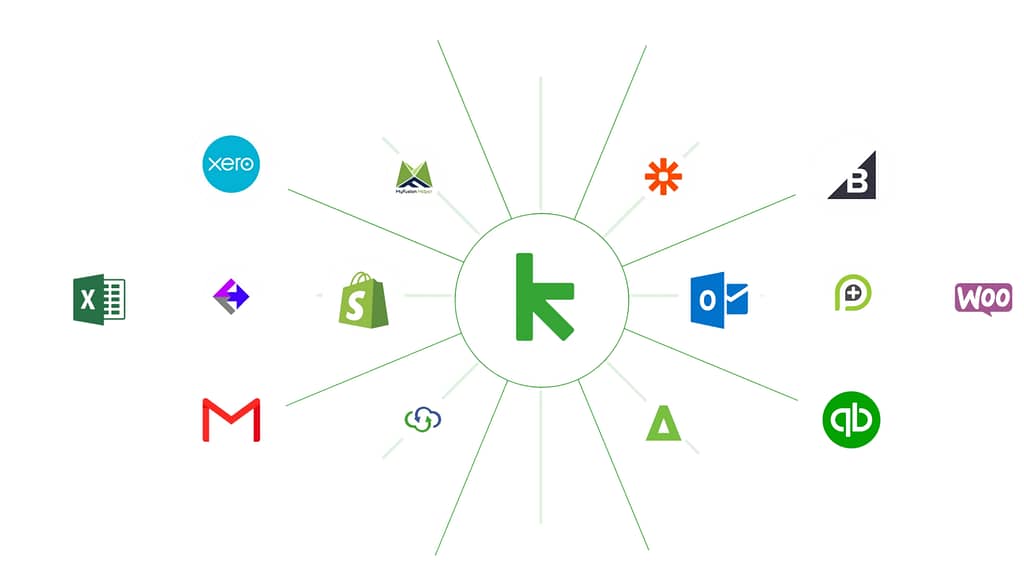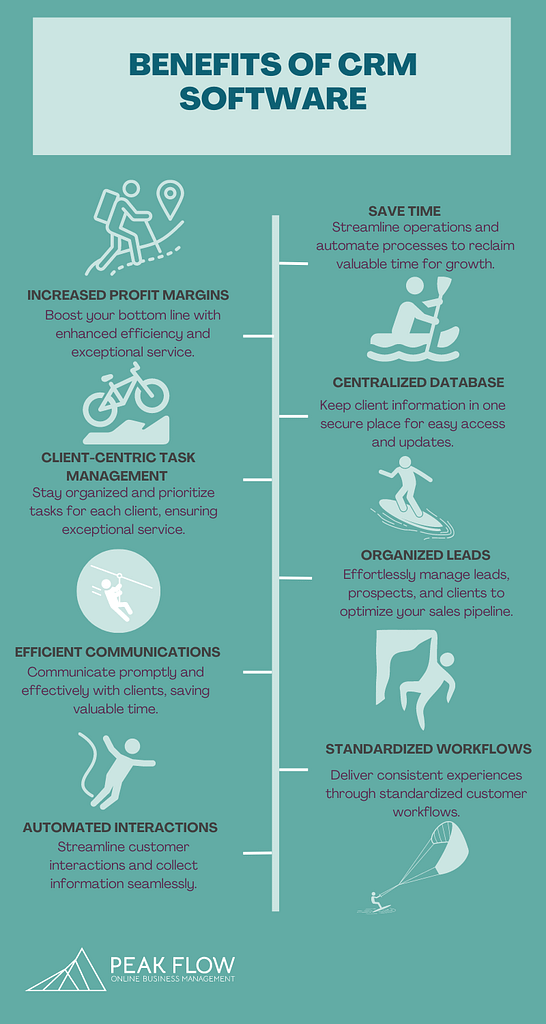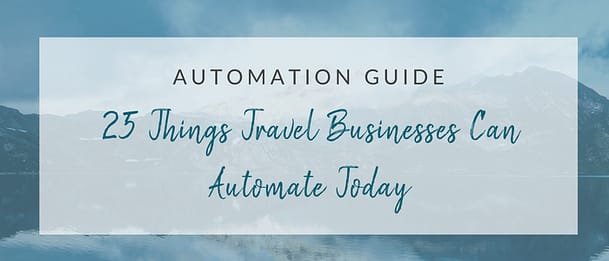
What is a CRM & Why Your Travel Business Needs One
Are you running a travel company? If so, then you know how important it is to keep track of customer relationships. With the right tools and strategies in place, your business can benefit from improved customer service and more efficient operations. One way to do this is by implementing a Client Relationship Manager system.
Dedicated CRM software helps businesses streamline their processes and manage customer data in one central location. A Client Relationship Manager provides an easy-to-use platform for tracking contacts, managing sales opportunities, automating daily client tasks, and monitoring leads and sales metrics—all essential functions for any successful travel company. In this blog post, we’ll explain what a CRM is and why your travel company needs one.
What is a CRM?
CRM stands for Customer Relationship Management. It is software designed to manage interactions with customers and leads throughout the entire customer lifecycle, from the first contact to repeat customer and all the steps in between.
The primary goal of a Client Relationship Manager is to improve business relationships with customers, increase customer retention and loyalty, and ultimately, drive sales. CRM software typically includes functionality for managing customer data, tracking customer interactions and communications, automating sales and marketing processes, and analyzing customer behaviour and trends to identify opportunities for growth and improvement.
CRM software are used by businesses of all sizes and across various industries, including retail, healthcare, finance, and travel. Some popular examples of CRM software include Salesforce, HubSpot, Keap and Zoho while the travel industry options include Travel Joy, Lemax and Moonstride.
Why Travel Businesses Need a CRM
Client Relationship Management software is essential for travel companies looking to provide personalized experiences, improve customer engagement, and build long-term customer loyalty. The travel industry deals with a large volume of customer data, including contact information, travel preferences, booking history, and trip feedback.
CRM software enables travel companies to efficiently manage this data, making it easier to personalize services, create targeted marketing campaigns, and allows solopreneurs and teams to provide better customer experience by having a 360-degree view each customer’s history. This helps sales agents and operations teams to quickly access customer information, resolve issues faster, and provide personalized recommendations.
Why do travel companies need CRM solutions?
Effortless Personalization with Existing Customers
With a CRM platform, travel companies can tailor every customer interaction by tracking customer behaviour and preferences. This allows for more personalized emails and calls, resulting in increased loyalty and retention rates. Imagine sending annual birthday greetings to all your former travellers or emailing them a year before their passport expires – these are effortless personalized touches that keep you top of mind.
Increased Efficiency and Time Management
Dedicated CRM software is designed to selectively automate and streamline sales, marketing, and customer service processes. This helps agents to save time by eliminating the need to manually enter data or search for information in multiple software or scroll through endless email threads. A good CRM solution helps travel companies stay organized and focused on the most important task at hand – creating itineraries and delivering outstanding travel experiences.
Improved Customer Retention
By storing client information all in one place, it is easier to build deeper relationships with customers. You and your team can view each customer’s journey, allowing for more targeted marketing campaigns and special offers that help keep current customers engaged and attract new ones. Engaged and loyal customers are more likely to refer others and those new clients we want to ensure become repeat and loyal travellers too.
Simplified Sales Process & Increased Sales
By having a centralized database of client information, you and your team will have better visibility into the sales pipeline, enabling you to identify bottlenecks, track progress, and prioritize activities. This can improve sales team efficiency and increase the likelihood of closing deals.
You and your team may also be able to increase sales by identifying cross-selling and upselling opportunities based on customer purchase history and preferences. This can increase the average order value and drive additional revenue. A robust CRM may also help businesses track customer loyalty and identify advocates who are likely to refer others to the brand. This can drive new business and increase revenue over time.
Why choosing the right CRM early on can make all the difference
By implementing a CRM platform early on, small businesses can build strong relationships with customers from the start. CRM software enables travel companies to track clients from their first booking, ensuring that all relevant information is captured and stored in one place. This can save time and effort down the road, as it eliminates the need to update hundreds or thousands of records later.
Additionally, choosing the right CRM early on can help bring new team members up to speed faster as the business grows. With a centralized database of customer information, new team members can quickly familiarize themselves with the company’s customer base, history, and preferences. Overall, implementing the right CRM system early on can set travel businesses up for long-term success by providing a solid foundation for efficient customer management and growth.

How to Choose the Best CRM for Your Travel Business
Choosing the best CRM for your travel business can be a daunting task, but it is essential for long-term success. The first step in choosing a CRM system is assessing your needs. This includes identifying your budget, the features you need, and any contact limits that may apply. It’s important to consider the specific needs of your travel business, such as the ability to track customer travel history, manage invoicing, and automate email communications and tasks.
When evaluating different CRM software, look for features that align with your business goals and priorities. For example, if you want to improve customer engagement, look for a CRM system that enables personalized email and/or social media communication and targeted marketing. Or if you’re seeking efficiency, look for a CRM with sales and marketing automation or options to integrate with other tools you use.
Additionally, consider the scalability of the system and whether it can grow with your business over time. Finally, make sure to review the CRM’s customer service offerings and pricing structures to ensure you’re getting the best value for your money. By taking the time to evaluate different CRM software upfront, you can save yourself a lot of headaches later on.
Understanding Compatibility
Determining the compatibility of CRM software with other tools in a business’s tech stack is critical to ensuring seamless workflow and maximizing efficiency. There are basically 3 ways to get all the tools you need;
- Choose a travel-specific CRM that comes with the itinerary builder or other features like trip costing or supplier management.
- Choose a CRM with built-in integrations with other tools you already use such as email marketing platforms, booking software, project management tools and Quickbooks.
- Choose the CRM you want to use then use API or pay for third-party tools like Zapier to connect with hundreds of other apps and services. Watch out for ongoing maintenance of external connections!
Overall, evaluating compatibility requires careful consideration of existing tools and business workflows, as well as the available integration options and ease of implementation.
Tips for Choosing the Right CRM
Choosing the right CRM for your travel business can be overwhelming, but there are several tips that can help simplify the process. Our top tip is to request a demo or free trial of the CRM tool before making a decision. This allows you to get a firsthand look at the features and functionality of the CRM system, as well as ask questions and evaluate the ease of use.
We also recommend talking to the CRM’s customer support team. This can provide insights into the level of support and assistance available, which can be critical for efficient implementation and ongoing use of the system.
Additionally, consider speaking with other businesses in your industry to learn about their experiences with different CRM software. This can provide valuable insights into the strengths and limitations of different software and help identify the best fit for your specific business needs.
Finally, consider speaking with a travel software consultant who can provide expert guidance and recommendations based on your business goals and requirements. You can book a 2-hour Travel Systems Consultation with Katie to work through which CRM is best for your travel business.
Overall, by taking a strategic and thorough approach to choosing a CRM system, travel businesses can select the best fit for their unique needs and set themselves up for long-term success.
Next Steps
- Read more about CRMs here
- Read our top CRMs for travel businesses
- Get a demo or free trial of the CRMs you’re seriously considering and begin testing
- Book your Travel Software Consult Call

